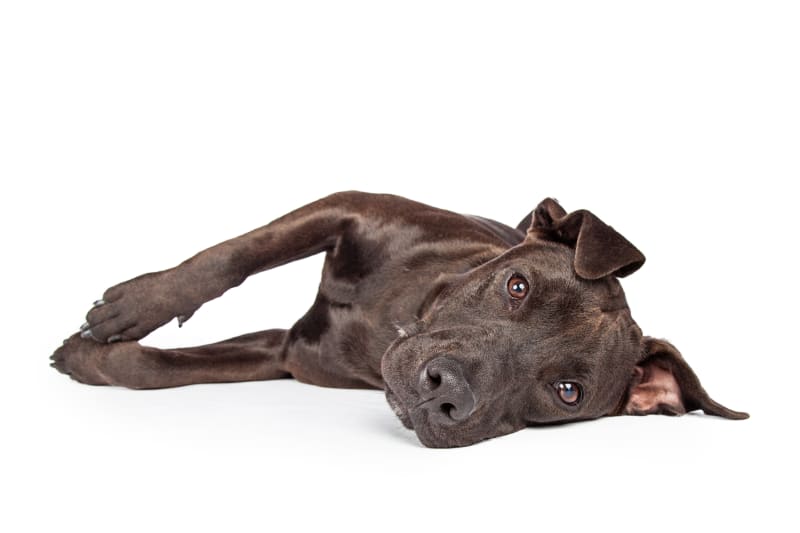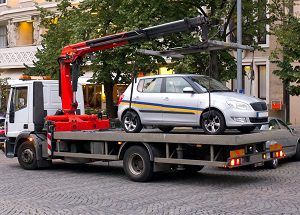When Is Dog Diarrhea An Emergency?
When Is Dog Diarrhea An Emergency?

Most dogs will experience an upset stomach at some point throughout their lives.
Diarrhea is a common symptom of many GI complications in dogs, ranging from dietary indiscretions to contagious illness.
Though diarrhea does not seem like a big deal in dogs, it can turn into a medical emergency in some cases.
So when is dog diarrhea an emergency and when should you contact an emergency vet for help?
To help you better understand when you should have your dog seen for their diarrhea, let’s discuss the details below.
What Is Normal Poop For Dogs?
To spot any abnormal poop or diarrhea in your dog, it’s important to understand what normal poop looks like in dogs.
Subscribe to Emergency Vets USA!
Get updates on the latest posts and more from Emergency Vets USA straight to your inbox.
SUBSCRIBE
I consent to receiving emails and personalized ads.
Healthy dog poop should be firm enough to pick up easily, and it should appear chocolate brown in color.
Consistency of the stool may range occasionally, but it should always be firm enough to be picked up without difficulty.
What Is Considered Diarrhea In Dogs?
If you have not seen canine diarrhea yet, you may not know what it looks like.
You can typically diagnose diarrhea in dogs anytime it is difficult to pick up, and it ranges from pudding consistency to liquid.
Diarrhea can also range in color based on the cause of their GI upset, so this is also a detail you should relay to your veterinarian.
What Causes Diarrhea In Dogs?
There are many potential causes of diarrhea in our canine companions.
GI upset in dogs can range from mild to severe based on the underlying factor, so let’s introduce you to the many diarrhea causing scenarios our pups get themselves into.
Some of the most common causes of diarrhea in dogs include:
- Eating things they shouldn’t such as trash, aluminum foil, spoiled food, dirt, and more
- Eating fatty human foods
- Exposure to bacteria that makes its way to the digestive tract
- Stressful events
- Canine anxiety in general
- Sudden diet changes
- Contagious gastrointestinal illness
- Intestinal parasites
- Starting new medications
- Allergies to food
- Toxin ingestion
- Pancreatitis
- Kidney disease
- Certain forms of GI cancer
Though most cases of diarrhea in dogs are a result of benign issues, there are an array of possibilities.
This is why we always suggest having your dog seen if they have diarrhea that persists for more than 24 hours, and even sooner if they have other strange symptoms.
Other Signs Of GI Upset In Dogs Other Than Diarrhea
Diarrhea is the main topic of discussion today, but it’s important to be aware of the other forms of GI upset seen in dogs.
Some dogs will experience these symptoms in addition to their diarrhea, and this often points to the presence of an underlying complication.
Some of the other signs of GI upset in dogs include:
- Vomiting
- Lip smacking
- Drooling
- Decreased appetite or anorexia
- Lethargy
- Abdominal pain
- Weakness
- Excessive thirst
If you notice any of the above symptoms in addition to your dog’s diarrhea, we suggest having them seen by a veterinarian.
The Dangers Of Diarrhea In Dogs
As we mentioned above, diarrhea in dogs can turn into an emergency in some cases.
There are a few very serious complications that can occur when a dog has diarrhea, so let’s discuss a few below.
Dehydration
One of the most common complications of diarrhea in dogs is dehydration.
Diarrhea can lead to excessive fluid loss from the body, especially if the dog has multiple rounds of diarrhea.
This is also further exacerbated if the dog is vomiting or they are not drinking.
Anorexia
Diarrhea can cause a dog to feel very ill, especially if they are having multiple rounds of it.
This may lead to a decreased appetite in many furry friends, with some even avoiding food altogether.
If the diarrhea persists and the dog continues to refuse food or water, this can lead to significant dehydration and weakness and then lead to an emergency.
HGE
Hemorrhagic gastroenteritis (HGE) is a serious medical condition that is characterized by the presence of bloody diarrhea.
This can occur suddenly in some furry friends, or after a period of untreated diarrhea.
HGE has an increased likelihood of dehydration and shock as a result of fluid and blood loss, and is considered a medical threat that requires immediate intervention.
HGE can be fatal if a dog does not receive treatment.
Shock
If a dog becomes too dehydrated from their diarrhea and other forms of GI upset, they can go into shock.
Shock is a serious complication that requires immediate rehydration and care, so it is always important to be aware of this risk if your dog is having excessive diarrhea.
If you believe your dog is going into shock, then immediately call an emergency vet.
The Possibility Of Underlying Conditions
Though this is not a risk of diarrhea itself, it is something you should be aware of when your dog is having GI upset.
Diarrhea can be a result of an array of underlying medical conditions, so you never want to ignore something that could be potentially serious.
Is Diarrhea An Emergency In Dogs?
Though one round of diarrhea may not be a reason to rush your dog to the nearest emergency vet, multiple rounds of diarrhea certainly can be.
A dog that is having diarrhea for more than 24 hours is obviously struggling with some form of GI complication, or even those having multiple episodes of diarrhea in a short period of time.
If your dog has had diarrhea for more than 24 hours, or is passing frequent diarrhea in a short period, we always suggest having them seen by a veterinarian.
This is especially true if they are experiencing other forms of GI upset as well, ranging from a decreased appetite to vomiting.
Is Bloody Diarrhea An Emergency In Dogs?
Bloody diarrhea is always considered an emergency in dogs.
Bloody diarrhea can be a result of a serious condition known as HGE, or even the result of an ingested toxin.
Bloody diarrhea can lead to significant dehydration and shock if it is not addressed immediately, so the presence of this symptom should always require an immediate trip to your vet’s office.
If your vet is closed when your dog begins to have diarrhea, we suggest making a trip to an emergency vet hospital.
When Should I Take My Dog To The Vet For Diarrhea?
If your dog is suddenly having diarrhea, you may be wondering when you should reach out to your vet for help.
Sometimes diarrhea can be a one off thing that resolves on its own, so many dog owners are hesitant to immediately bring their pups to the vet.
First, we should state one more time that if a dog is having bloody diarrhea, they should be seen immediately.
No matter the details surrounding their symptoms, bloody diarrhea always warrants a prompt vet visit.
If your dog is having standard diarrhea, there are a few factors to consider.
First, if your dog has had one round of diarrhea, it is typically okay to monitor your pup at home in case it resolves.
If your dog is acting fine otherwise and the diarrhea does not occur again, then you may not need to take them to the vet.
However, if your dog has had more than one round of diarrhea, we always suggest giving your vet a call.
They can offer you guidance based on your dog’s symptoms, and even let you know how quickly they think your pup should be seen.
When Should I See An Emergency Vet For Dog Diarrhea?
If a dog falls ill overnight or on the weekend, many dog owners will need to make a trip to an emergency animal hospital.
Some dogs will also need to see an emergency vet if they are experiencing a severe illness, as some will require hospitalization that their standard vet cannot offer.
We always suggest seeing an emergency vet if your dog experiences the following complications when your vet’s office is closed:
- Bloody diarrhea
- Multiple rounds of diarrhea in a 24 hour period
- Vomiting
- Anorexia
- Lethargy
- Abdominal pain
We also suggest seeing an emergency vet if you think your dog’s diarrhea is a result of ingesting a toxin.
Final Thoughts On When Dog Diarrhea Is An Emergency
Many assume diarrhea is a minor health complication, but it can lead to serious illness for our canine companions.
If your dog ate something and is now having diarrhea, this might not warrant a trip to your vet.
It’s always better to give your veterinarian a call and let them know what is going on.
They may have you monitor your dog for a few days or bring them in to get checked.
-
Popular Cities
-
Popular Category










